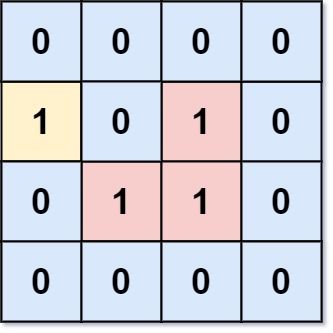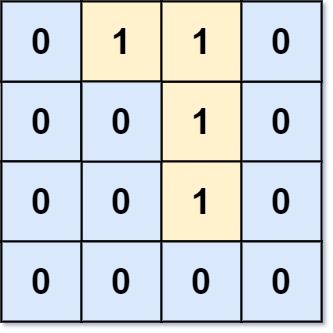You are given an m x n binary matrix grid, where 0 represents a sea cell and 1 represents a land cell.
A move consists of walking from one land cell to another adjacent (4-directionally) land cell or walking off the boundary of the grid.
Return the number of land cells in grid for which we cannot walk off the boundary of the grid in any number of moves.
Example 1:
Input: grid = [[0,0,0,0],[1,0,1,0],[0,1,1,0],[0,0,0,0]] Output: 3 Explanation: There are three 1s that are enclosed by 0s, and one 1 that is not enclosed because its on the boundary.
Example 2:
Input: grid = [[0,1,1,0],[0,0,1,0],[0,0,1,0],[0,0,0,0]] Output: 0 Explanation: All 1s are either on the boundary or can reach the boundary.
Constraints:
m == grid.lengthn == grid[i].length1 <= m, n <= 500grid[i][j]is either0or1.
DFS or Union find.
DFS:
class Solution:
def numEnclaves(self, grid: List[List[int]]) -> int:
def dfs(i, j):
grid[i][j] = 0
for a, b in [[0, -1], [0, 1], [-1, 0], [1, 0]]:
x, y = i + a, j + b
if 0 <= x < m and 0 <= y < n and grid[x][y] == 1:
dfs(x, y)
m, n = len(grid), len(grid[0])
for i in range(m):
for j in range(n):
if grid[i][j] == 1 and (i == 0 or i == m - 1 or j == 0 or j == n - 1):
dfs(i, j)
return sum(grid[i][j] for i in range(m) for j in range(n))Union find:
class Solution:
def numEnclaves(self, grid: List[List[int]]) -> int:
def find(x):
if p[x] != x:
p[x] = find(p[x])
return p[x]
m, n = len(grid), len(grid[0])
p = list(range(m * n + 1))
for i in range(m):
for j in range(n):
if grid[i][j] == 1:
if i == 0 or i == m - 1 or j == 0 or j == n - 1:
p[find(i * n + j)] = find(m * n)
else:
for a, b in [[0, -1], [0, 1], [-1, 0], [1, 0]]:
x, y = i + a, j + b
if grid[x][y] == 1:
p[find(i * n + j)] = find(x * n + y)
return sum(grid[i][j] == 1 and find(i * n + j) != find(m * n) for i in range(m) for j in range(n))DFS:
class Solution {
private int[][] grid;
private int m;
private int n;
public int numEnclaves(int[][] grid) {
m = grid.length;
n = grid[0].length;
this.grid = grid;
for (int i = 0; i < m; ++i) {
for (int j = 0; j < n; ++j) {
if (grid[i][j] == 1 && (i == 0 || i == m - 1 || j == 0 || j == n - 1)) {
dfs(i, j);
}
}
}
int ans = 0;
for (int i = 0; i < m; ++i) {
for (int j = 0; j < n; ++j) {
if (grid[i][j] == 1) {
++ans;
}
}
}
return ans;
}
private void dfs(int i, int j) {
grid[i][j] = 0;
int[] dirs = {-1, 0, 1, 0, -1};
for (int k = 0; k < 4; ++k) {
int x = i + dirs[k];
int y = j + dirs[k + 1];
if (x >= 0 && x < m && y >= 0 && y < n && grid[x][y] == 1) {
dfs(x, y);
}
}
}
}Union find:
class Solution {
private int[] p;
public int numEnclaves(int[][] grid) {
int m = grid.length;
int n = grid[0].length;
p = new int[m * n + 1];
for (int i = 0; i < p.length; ++i) {
p[i] = i;
}
int[] dirs = {-1, 0, 1, 0, -1};
for (int i = 0; i < m; ++i) {
for (int j = 0; j < n; ++j) {
if (grid[i][j] == 1) {
if (i == 0 || i == m - 1 || j == 0 || j == n - 1) {
p[find(i * n + j)] = find(m * n);
} else {
for (int k = 0; k < 4; ++k) {
int x = i + dirs[k];
int y = j + dirs[k + 1];
if (grid[x][y] == 1) {
p[find(i * n + j)] = find(x * n + y);
}
}
}
}
}
}
int ans = 0;
for (int i = 0; i < m; ++i) {
for (int j = 0; j < n; ++j) {
if (grid[i][j] == 1 && find(i * n + j) != find(m * n)) {
++ans;
}
}
}
return ans;
}
private int find(int x) {
if (p[x] != x) {
p[x] = find(p[x]);
}
return p[x];
}
}function numEnclaves(grid: number[][]): number {
const m = grid.length,
n = grid[0].length;
let ans = 0;
let queue = [];
// 统计全部1, 临边的1加入队列
for (let i = 0; i < m; i++) {
for (let j = 0; j < n; j++) {
let cur = grid[i][j];
if (cur) {
ans++;
if (i == 0 || i == m - 1 || j == 0 || j == n - 1) {
queue.push([i, j]);
ans--;
}
}
}
}
let directions = [
[-1, 0],
[1, 0],
[0, -1],
[0, 1],
];
while (queue.length) {
let nextQueue = [];
for (let [x, y] of queue) {
for (let [dx, dy] of directions) {
let [i, j] = [x + dx, y + dy];
if (i > 0 && i < m - 1 && j > 0 && j < n - 1 && grid[i][j]) {
nextQueue.push([i, j]);
ans--;
grid[i][j] = 0;
}
}
queue = nextQueue;
}
}
return ans;
}DFS:
class Solution {
public:
int m;
int n;
int numEnclaves(vector<vector<int>>& grid) {
m = grid.size();
n = grid[0].size();
for (int i = 0; i < m; ++i)
for (int j = 0; j < n; ++j)
if (grid[i][j] == 1 && (i == 0 || i == m - 1 || j == 0 || j == n - 1))
dfs(i, j, grid);
int ans = 0;
for (int i = 0; i < m; ++i)
for (int j = 0; j < n; ++j)
if (grid[i][j] == 1)
++ans;
return ans;
}
void dfs(int i, int j, vector<vector<int>>& grid) {
grid[i][j] = 0;
vector<int> dirs = {-1, 0, 1, 0, -1};
for (int k = 0; k < 4; ++k)
{
int x = i + dirs[k];
int y = j + dirs[k + 1];
if (x >= 0 && x < m && y >= 0 && y < n && grid[x][y] == 1)
dfs(x, y, grid);
}
}
};Union find:
class Solution {
public:
vector<int> p;
int numEnclaves(vector<vector<int>>& grid) {
int m = grid.size();
int n = grid[0].size();
p.resize(m * n + 1);
vector<int> dirs = {-1, 0, 1, 0, -1};
for (int i = 0; i < p.size(); ++i) p[i] = i;
for (int i = 0; i < m; ++i)
{
for (int j = 0; j < n; ++j)
{
if (grid[i][j] == 1)
{
if (i == 0 || i == m - 1 || j == 0 || j == n - 1) p[find(i * n + j)] = find(m * n);
else
{
for (int k = 0; k < 4; ++k)
{
int x = i + dirs[k];
int y = j + dirs[k + 1];
if (grid[x][y] == 1) p[find(i * n + j)] = find(x * n + y);
}
}
}
}
}
int ans = 0;
for (int i = 0; i < m; ++i)
for (int j = 0; j < n; ++j)
if (grid[i][j] == 1 && find(i * n + j) != find(m * n))
++ans;
return ans;
}
int find(int x) {
if (p[x] != x) p[x] = find(p[x]);
return p[x];
}
};DFS:
func numEnclaves(grid [][]int) int {
m, n := len(grid), len(grid[0])
dirs := []int{-1, 0, 1, 0, -1}
var dfs func(i, j int)
dfs = func(i, j int) {
grid[i][j] = 0
for k := 0; k < 4; k++ {
x, y := i+dirs[k], j+dirs[k+1]
if x >= 0 && x < m && y >= 0 && y < n && grid[x][y] == 1 {
dfs(x, y)
}
}
}
for i := 0; i < m; i++ {
for j := 0; j < n; j++ {
if grid[i][j] == 1 && (i == 0 || i == m-1 || j == 0 || j == n-1) {
dfs(i, j)
}
}
}
ans := 0
for i := 0; i < m; i++ {
for j := 0; j < n; j++ {
if grid[i][j] == 1 {
ans++
}
}
}
return ans
}Union find:
func numEnclaves(grid [][]int) int {
m, n := len(grid), len(grid[0])
p := make([]int, m*n+1)
for i := range p {
p[i] = i
}
var find func(x int) int
find = func(x int) int {
if p[x] != x {
p[x] = find(p[x])
}
return p[x]
}
dirs := []int{-1, 0, 1, 0, -1}
for i := 0; i < m; i++ {
for j := 0; j < n; j++ {
if grid[i][j] == 1 {
if i == 0 || i == m-1 || j == 0 || j == n-1 {
p[find(i*n+j)] = find(m * n)
} else {
for k := 0; k < 4; k++ {
x, y := i+dirs[k], j+dirs[k+1]
if grid[x][y] == 1 {
p[find(i*n+j)] = find(x*n + y)
}
}
}
}
}
}
ans := 0
for i := 0; i < m; i++ {
for j := 0; j < n; j++ {
if grid[i][j] == 1 && find(i*n+j) != find(m*n) {
ans++
}
}
}
return ans
}

